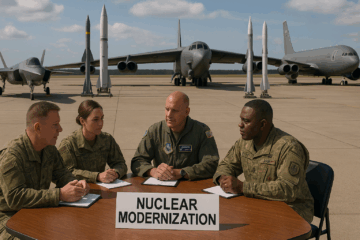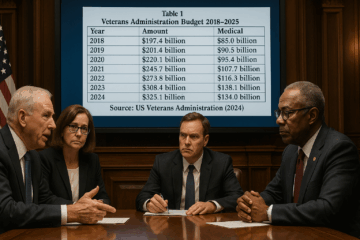Imagine a world where America’s allies are forced to develop their own nuclear arsenals. Instead of enhancing security, this proliferation could heighten the risk of nuclear conflict. Such a scenario is not speculative. It is a likely outcome if the United States abandons its extended deterrence commitments. While President Trump, Secretary of States Marco Rubio, and Vice President JD Vance have all publicly stated that the United States remains committed to the North Atlantic Treaty Organization (NATO), American pressure for reform is worrying NATO’s member-states.
Extended deterrence, commonly known as the “nuclear umbrella,” represents America’s commitment to defend its allies against strategic threats, including the use of nuclear weapons. Since the late 1940s, this policy provides security guarantees to NATO members and Asian allies like Japan and South Korea.
Rising threats from adversaries like North Korea and Iran, coupled with the modernization of arsenals by Russia and China, underscore its continued necessity. Without this safeguard, allies may feel compelled to pursue independent nuclear programs, triggering preventable proliferation that can destabilize entire regions and weaken American influence.
Consider a scenario where the United States’ failure to build a peer theater nuclear capability and public statements are viewed by allies as a reduction in American nuclear commitments in East Asia. Japan, confronted by an assertive China and threatening North Korea, initiates a covert nuclear program, leveraging its advanced civilian nuclear technology and plutonium reserves. Constitutional constraints notwithstanding, mounting public anxiety could drive Tokyo toward its first nuclear test.
South Korea, facing similar security vulnerabilities, revives its previously dormant nuclear ambitions. Taiwan, under existential threat from China, sees nuclear capability as essential for survival. Alarmed by these developments, President Xi Jinping orders an accelerated attack on Taiwan and, potentially, attacks targets in South Korea and Japan to preempt support of Taiwan.
This ripple effect would yield devastating global repercussions. The Treaty on the Non-Proliferation of Nuclear Weapons (NPT), a cornerstone of nonproliferation, ceases in relevance. Nations such as Saudi Arabia, Turkey, Germany, and Poland might explore nuclear options. With more nuclear actors in play, risks increase as a statistical probability. Diplomatic and economic instability would likely surge, potentially fracturing alliances, crippling foreign investment, and destabilizing global markets.
Extended deterrence is not merely about preventing proliferation; it provides substantial military and economic benefits as well. American allies contribute robust defense capabilities, hosting critical strategic bases essential for American operations. South Korea’s military fought alongside American forces in every conflict since Vietnam, while Japan’s formidable naval and air capabilities enhance American strategic flexibility. European NATO allies provide indispensable missile defense and air operations infrastructure, reinforcing American global power projection.
Economically, the nuclear umbrella fosters stability, encouraging foreign direct investment from treaty allies like Japan, Germany, and South Korea—three of the top investors in the US. This security framework ensures mutual prosperity and deepens economic interdependence, strengthening not just trade partnerships but long-term strategic relationships. South Korea, the world’s 14th-largest economy, thrives under this arrangement, further reinforcing cross-border trade and investment.
Upholding extended deterrence demands a long-term investment of American resources, ensuring stability across NATO. Allied nations pledged to meet defense spending commitments, emphasizing the principle that collective security thrives on shared responsibility. Given that the US allocates just under three percent of its gross domestic product (GDP) to defense, committing at least two percent is a reasonable expectation.
Eleven nations met the two percent target in 2023, up from just four in 2017. President Trump’s pressure campaign on NATO defense spending is working. If every NATO nation adhered to the two percent minimum, the alliance’s total defense budget would rise by over $100 billion annually, reinforcing military capabilities, strengthening infrastructure, and fortifying global stability.
More than just a financial obligation, honoring these agreements is fundamental to sustaining NATO’s unity and trust. Increased investment not only bolsters collective security but also eases the strain on the US, which continues to shoulder the responsibility of protecting Western civilization from instability.
Extended deterrence long served as the backbone of global stability, shaping a world where security, military cooperation, economic prosperity, and nuclear nonproliferation are upheld. Stability is not self-sustaining; it demands vigilance, action, and unwavering commitment. NATO’s legacy proves this repeatedly. From coalition forces uniting in Kosovo to prevent ethnic cleansing, to NATO-led air campaigns in Libya that dismantled an oppressive regime, alliance members stood together in moments of crisis. Joint operations in Afghanistan, where NATO countries fought side by side for nearly two decades, showcased the strength of shared commitment. Even today, as NATO fortifies defenses in Eastern Europe, the principle remains unchanged. Security is only as strong as the unity behind it.
NATO’s Article 5 is more than a pledge; it is a promise that must be upheld through action. Security is not theoretical; it is built on resources, strategy, and cooperation. The deterrence piggy bank needs deposits, not just withdrawals. If allies fail to uphold their commitments, the burden on the US becomes untenable.
The stakes could not be higher. Geopolitical tensions are rising, nuclear threats are evolving, and adversaries are watching for cracks in the foundation. The American nuclear umbrella remains a pillar of international security, but it is only as strong as the resolve behind it. Allies must step up because if they do not, the rain will come, and they will find themselves unprotected in the storm.
Brandon Toliver, PhD, serves on the A4 staff of Headquarters Air Force. The views expressed are those of the author and do not reflect the official guidance or position of the United States government, the Department of Defense, the United States Air Force, or the United States Space Force.




